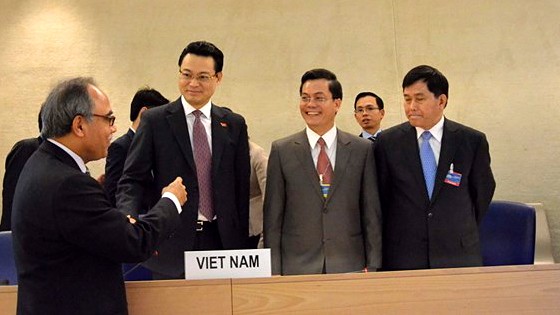(VOVworld)- The US State Department recently released its 2013 Country Reports on Human Rights Practices discussing human rights issues in several countries including Vietnam. In addition to recognizing Vietnam’s progress, the report still includes inaccurate information and does not reflect the real situation in Vietnam. Vietnam has consistently strengthened dialogues with other countries to increase accuracy and objectivity in assessing human rights in Vietnam.
In response to the US State Department’s Human Rights report, the spokesperson for Vietnam’s Foreign Ministry Le Hai Binh said that ensuring human rights is a priority of all Vietnamese socio-economic policies. Binh emphasized that Vietnam is always willing to enter in a straightforward and constructive spirit into dialogue with other countries that hold different points of view on human rights, including the US.

Delegates congratulated Vietnam after its report was approved at the 18th session of the Human Rights Council UPR working group on February 7 |
In an exclusive interview granted to Washington DC-based VOV correspondent Uzra Zeya, the Acting Assistant Secretary for Democracy, Human Rights, and Labor said that an optimal way to deal with differences between the US and Vietnam over human rights is through dialogue and interaction.
Frank dialogue enhances understanding
Vietnam and the US have held 17 human rights dialogues since they normalized relations in 1995. They have frankly discussed issues of common concern, aiming to settle outstanding differences. As a result, Vietnam’s achievements in promoting human rights have been recognized by the US. In November, 2013, Vietnam was elected to the UN Human Rights Council receiving the most votes of all nominees. Vietnam’s Universal Periodic Review (UPR) Report was also approved by the Human Rights Council UPR working group in February 2014. These recognitions have been resulted from frank and serious dialogues. Vietnam has responded to and is committed to clarifying recommendations from other countries considering them specific references to continue ensuring people’s fundamental rights. Vietnam’s Deputy Foreign Minister Ha Kim Ngoc, headed the Vietnamese UPR delegation to the UN Human Rights Council in Geneva in February: “Upon receiving recommendations, Vietnam held a meeting to review them. Most of the recommendations are in line with our renovation orientations and guidelines of the Party and State and the reality of human rights in Vietnam. The recommendations are useful, helping us better identify priorities in promoting human rights. We will take into serious consideration these recommendations and by doing so, Vietnam shows its commitment to the international community”.
Vietnam’s human rights progress internationally recognized
Vietnam’s laws related to human rights have been fine-tuned, ensuring that economic, cultural and social growth goes hand in hand with the improvement of people’s material and spiritual lives. Vietnam’s achievements in this regard have been undeniable. The international community has made serious and frank evaluations of the exercise of human rights in Vietnam. However, there are still some biased views on Vietnam’s human rights, which might come from different purposes and motives. In response to these contrary viewpoints, Vietnam is willing to hold dialogues considering it the most important channel to eliminate differences. Vietnamese Ambassador to the UN Le Hoai Trung said:“Some countries directly or indirectly incite terrorism in others. Vietnam, which recently concluded a long war, still has to cope with a number of forces who are trying to cause social disorder. Vietnam, with 54 different ethnic groups, has never experienced any ethnic war and any attempt to provoke ethnic conflicts or cause other social disorder is unacceptable.
In the near future, Vietnam intends to continue promoting and protecting human rights and enhancing international cooperation in this regard. This is a long-term project that requires continuous effort. In this effort, Vietnam considers dialogue the most important way to demonstrate its commitment to human rights.